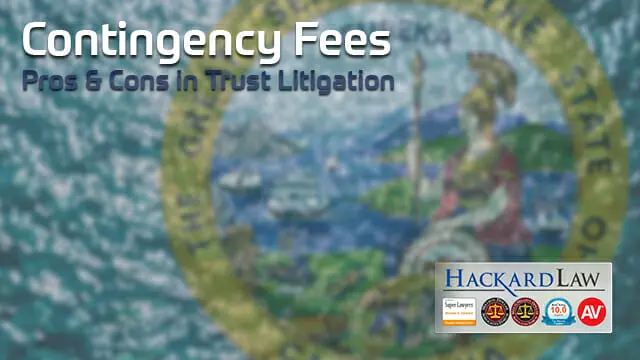
Contingency Fees | CA Trust Litigation Pros & Cons
Hackard Law is striving to be the leading plaintiffs’ trust and estate contingency fee law firm in California. This is no small task. Our state has terrific lawyers and law firms committed to the ethical and competent representation of vulnerable abused trust and estate beneficiaries. Many of the attorneys regularly prosecute civil elder financial abuse cases against well-funded defendants.
Setting specific and ambitious goals – like seeking preeminence in a field – leads to a higher level of performance than easy or general goals. With this in mind and in the spirit of “if you care, you share,” I’ll address some of the stark differences that often exist between unfunded trust and estate challengers and their well-funded opponents.
I receive several calls each week from Californians or out of state callers seeking to challenge a California trust, estate or nonprobate transfer. A nonprobate transfer is a transfer of property that occurs on the death of a decedent and passes property to a beneficiary outside the oversight of a probate court.
Callers may be children, grandchildren or brothers or sisters of the decedent. Callers may be omitted spouses or claimants under California’s Elder Abuse and Dependent Adult Civil Protection Act (“elder abuse statute”). Some observed generalities include: caller vulnerability against well-funded potential defendants; limited means such that a contingency fee offers the most realistic hope of establishing a legal claim; the silent treatment from likely defendants; and feelings of betrayal.
I often explain that Hackard Law only takes trust, estate and elder financial abuse litigation cases where (1) we think that we can make a significant difference and (2) there is a respondent or defendant who can be made financially accountable for their wrongdoing. This standard is important to apply. There are far more viable cases than the availability of counsel. Our time and availability are finite, the costs of litigation can be enormous and the funding differences between a plaintiff and defendant with access to trust funds can be huge. This is serious litigation and requires a serious analysis before embarking on a litigated challenge.
If the caller is seeking a contingency fee I generally explain that according to the rules of a contingency agreement, a contingency fee litigation attorney will only be paid if and when they obtain recovery from the disputed trust, estate or defendant by settlement or trial. Contingency fees must conform to California law, are negotiable, must be signed by the attorney and the client, and must explain how the disbursement of costs will affect the contingency fee and the client’s recovery.
I often counsel that an important consideration in this type of litigation is an analysis of likely medical evidence as well as how the defendant will fund their defense. Attorneys Jeff Galvin & Tyson Hubbard, editors of the Trust on Trial litigation blog, explain the difficulties with contingency fees in their article titled “Why Contingency Fee Representation Is Hard to Obtain in Trust and Will Contests.” The well-researched and thoughtful article recites that they generally “decline requests for contingency fee representation, choosing instead to represent contestants who can pay us on an hourly basis.” They explain that “[w]ithout a credible valuation of the underlying estate, counsel will not be able to calculate the upside of contingency representation.” They also accurately note that “it is not easy to invalidate a trust and/or a will in California on the theory of mental capacity” and state that “[u]ndue influence is also challenging to prove.” Galvin and Hubbard point out other limitations – including the short time periods to challenge a trust contest and the likely existence of a trustee war chest “to fight off any contest even if the trustee is favored as a beneficiary in the questionable amendment.”
Plaintiffs lawyers are faced with the very real hurdles identified in the Trust on Trial litigation blog. That said, over the 40 plus years of my career I have represented several thousand clients in contingency fee matters. It is not easy. On the other hand, contingency fees are necessary to ensure that as many people as possible are able to obtain competent representation and ultimate access to justice. Lawyers do assume significant risks, and this risk-sharing element of contingency fees positive elements. The Texas Supreme Court recently observed that this risk-sharing feature creates an incentive for lawyers to work diligently and obtain the best results possible. The Court identified the closely related benefit is the contingent fee’s tendency to reduce frivolous litigation by discouraging attorneys from presenting claims that have negative value or otherwise lack merit.
California has particular rules as to contingency fee contracts. A Formal Opinion from the State Bar’s Standing Committee on Professional Responsibility and Conduct explains:
“For a contingency fee contract to be enforceable, the attorney must ensure compliance with certain safeguards. California Business and Professions Code section 6147 is designed to protect clients by requiring, among other things, that: (a) the agreement be in writing with a signed duplicate original provided to the client; (b) the client be notified that the fee is negotiable; and (c) the client be notified of the percentage fee as well as the manner in which costs and disbursements will affect the size of the fee and the client’s recovery. In addition to statutory regulation of attorney fee contracts, contingent fees are governed by rule 4-2006, which states that an attorney may not charge an unconscionable fee.”[1]
Hackard Law represents clients in estate, trust and elder financial abuse litigation in most of California’s major urban areas, including Los Angeles, Santa Clara, Alameda, San Diego and Sacramento. If you would like to call us about your case we can be reached at 916 313-3030.
[1] THE STATE BAR OF CALIFORNIA STANDING COMMITTEE ON PROFESSIONAL RESPONSIBILITY AND CONDUCT FORMAL OPINION NO. 2006-170

 (916) 775-8542
(916) 775-8542